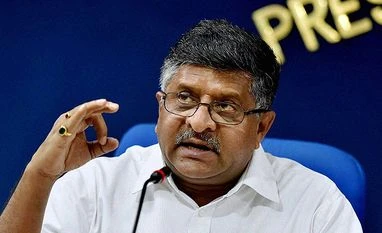Making its disagreement with the Supreme Court's decision to strike down National Judicial Appointments Commission (NJAC) very clear, government today said the verdict is a "setback to parliamentary sovereignty".
Union Minister Ravi Shanakar Prasad, who had piloted the NJAC bill in Parliament as the law minister, said the order had raised questions over the sovereignty of Parliament, which had unanimously passed the legislation that also received ratification from 20 state assemblies.
"While holding very dearly the principle of independence of judiciary, I regret to say that parliamentary sovereignty has received a setback today... Questions have been raised on parliamentary sovereignty," he told a press conference here, adding that the government will decide its future course of action after reading the 1030-page judgement and consultation.
Highlighting the backing the bill enjoyed, he said it was a "unique moment in the Indian polity" when all political formations supported the setting up of NJAC to replace the 22-year-old collegium system, which has now been revived by the apex court.
Prasad wondered whether "judges appointing judges is the only way of judicial independence", as decided by the Supreme Court today.
Noting that the executive had a greater role in appointing judges before 1993 when the collegium system was introduced, the minister raised a poser, asking if the judges appointed during that era lacked in any way as he cited the names of some of the finest judges, including M N Venkatachaliah and V R Krishna Iyer, appointed under that system.
He also insisted that the judiciary had "domination" in the NJAC and executive had only one member in it.
Union Minister Ravi Shanakar Prasad, who had piloted the NJAC bill in Parliament as the law minister, said the order had raised questions over the sovereignty of Parliament, which had unanimously passed the legislation that also received ratification from 20 state assemblies.
"While holding very dearly the principle of independence of judiciary, I regret to say that parliamentary sovereignty has received a setback today... Questions have been raised on parliamentary sovereignty," he told a press conference here, adding that the government will decide its future course of action after reading the 1030-page judgement and consultation.
Highlighting the backing the bill enjoyed, he said it was a "unique moment in the Indian polity" when all political formations supported the setting up of NJAC to replace the 22-year-old collegium system, which has now been revived by the apex court.
Prasad wondered whether "judges appointing judges is the only way of judicial independence", as decided by the Supreme Court today.
Noting that the executive had a greater role in appointing judges before 1993 when the collegium system was introduced, the minister raised a poser, asking if the judges appointed during that era lacked in any way as he cited the names of some of the finest judges, including M N Venkatachaliah and V R Krishna Iyer, appointed under that system.
He also insisted that the judiciary had "domination" in the NJAC and executive had only one member in it.
)